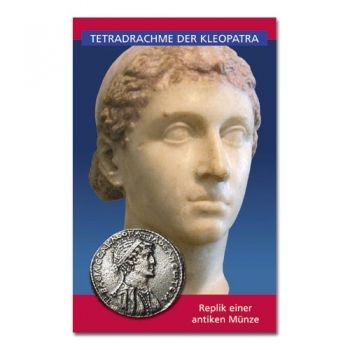Tetradrachm of Cleopatra VII
Tetradrachm of Cleopatra VII
Obverse: portrait of Cleopatra with the Greek inscription: BACIΛICCA KAEOΠATPA ΘEA NEΩTEPA - Queen Cleopatra, new goddess.
Rev: Head of Marc Antony with the inscription: ANTΩNIOC AYTOKPATΩP TPITON TPIΩN ANΛPΩN - Antony Autokrator (Imperator), Triumvir. This designation refers to his triumvirate (alliance of three), which he had opened up with Octavian (later Emperor Augustus) and Lepidus, and which had been extended for five years shortly before (37 BC).
The tetradrachm (silver coin) was minted by Cleopatra and Marc Antony in Antioch in about 36 BC.
Material: Tin alloy with patination.
All coin replicas were moulded from originals. They are available individually or in various sets.
Surviving prices for the 1st and 2nd century
1 aureus = 25 denarii,
1 denarius = 25 sestertii,
1 sestertius = 2 dupondii,
1 Dupondius = 2 Ass.
A pig costs 75 denarii
"Pecunia non olet!" - Money does not stink
Emperor Vespasian had taken over from his predecessor Nero a state that was almost bankrupt.
Vespasian reorganised the public budgets with great success. His ingenuity in increasing state revenues was great. Among other things, he introduced a tax on public latrines. When his son Titus objected to this, he held some coins from the tax revenue under his nose and asked if this smell bothered him. Titus had to concede that the money did not stink: Pecunia non olet.
The saying has persisted to this day to justify the possession of money from dubious sources of revenue. The public toilets in Paris are still called "Vespasienne" today. In Italy, too, the public toilets are called "Vespasiani".

